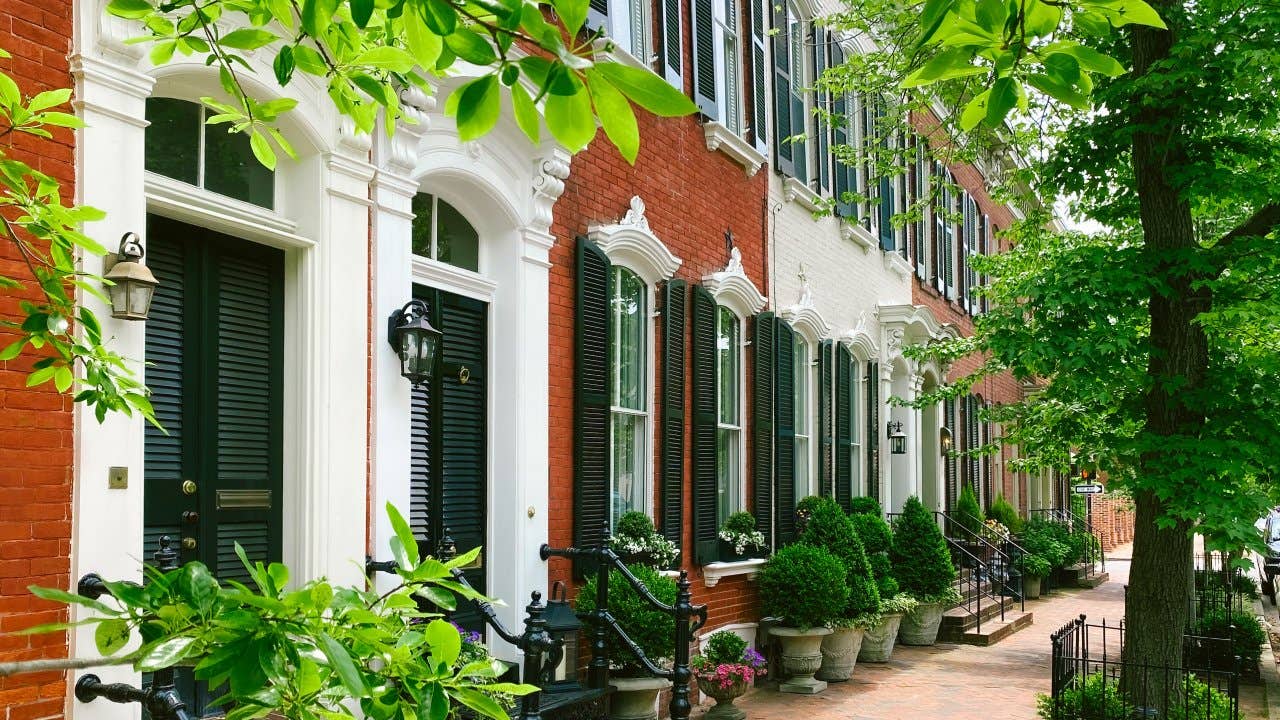How to buy a townhouse: 5 tips to follow

Key takeaways
- Townhouses offer homeownership at a more affordable price point than a freestanding single-family home.
- However, in exchange you’ll likely have less space, less privacy and potentially high HOA fees.
- When buying a townhouse, it’s smart to work with an agent who is knowledgeable about the townhouse communities in your specific area.
If you’re thinking about buying a townhouse, often also called a townhome, you’re in good company. Behind detached single-family homes, townhouses were the second most common home choice among U.S. buyers in 2023, according to a National Association of Realtors study.
While the process of buying a townhouse is not unlike buying a home of any other kind, there are some differences you’ll need to be aware of when shopping. Whether you’re a first-time homebuyer, looking for a second home or interested in downsizing, here’s a primer on how to buy a townhouse.
What is a townhouse?
Townhouses walk the line between detached single-family homes and condos, offering some of the best of both. They can differ widely in size and structure, but generally, townhouses are multilevel residences attached by a common wall to another residence, or two. Some have their own small yards or patios.
The government definition of a townhouse provides more guidance, at least when it comes to what qualifies as a single-family home. In order for a townhouse to be classified as a single-family structure by the U.S. Census Bureau, it must be separated from adjacent units by a ground-to-roof wall and maintain separate utilities and heating/air-conditioning systems from its neighbors.
Townhouses and condos are similar in many ways, but not exactly the same. One of the main differences is the degree of ownership. Unlike a condo, townhouse owners typically own both the interior of the home and the exterior land it sits on, including the yard (if applicable). Townhouse owners may or may not pay HOA fees for things like maintenance of common areas and trash pickup, as condo owners do.
Townhouse pros and cons
Just like any other type of home, townhouses can come with both positive and negative aspects.
Pros
- Affordability: Townhomes typically cost less than single-family homes of a similar size in the same area. Redfin data from October 2024 shows that the median sale price of a U.S. townhouse was $380,668, while the median for a detached single-family home was much higher at $453,734.
- Greater ownership: Unlike condos, with a townhouse you generally have ownership over the exterior as well as the interior of the home. While an HOA may enforce certain aesthetic codes for the exterior, there’s generally more freedom to change appearances than you would have with a condo.
- Less maintenance: Because they’re smaller in size and on smaller lots than freestanding homes, it’s typically easier to maintain a townhome. And you’re typically not responsible for maintenance of the exterior of your home and shared grounds, says Sallie Cromwell Simmons, a broker with Zeitlin Sotheby’s International Realty in Nashville. “These are often taken care of with a monthly fee to a homeowner’s association,” she says.
- Shared amenities: Like condos, townhouses are frequently part of communities that share many desirable amenities, such as outdoor walking trails, pools, clubhouses and more.
Cons
- HOA rules and fees: Townhomes often come with monthly HOA fees that cover the exterior and grounds maintenance and common elements like sidewalks and lawn care. While that may be convenient for someone interested in a low maintenance home, it can also be costly, and the fee can change or increase over time. An HOA also has rules and regulations that may restrict how you can use your property and in what ways it can be altered.
- Lack of privacy: Because townhomes are attached units, there might not be as much privacy as you’d have with a freestanding home. For example, you might be able to hear your neighbors. And note the condition of a townhome’s adjoining properties — if the upkeep on these is poor, it may reflect badly on your home when it comes time to sell it.
- Less space: Townhouses tend to be much smaller and narrower than a freestanding house. They also feature multiple stories, which can be difficult for people with mobility issues.
5 tips for buying a townhouse
1. Hire an agent with townhouse experience
Real estate agents can act as your guide and advocate when purchasing a home. An agent who knows the townhouse communities in your specific area can advise you on local market conditions and the prices of other comparable properties nearby, especially within the same complex or community. He or she can also negotiate on your behalf and manage all the paperwork necessary to successfully purchase a home.
2. Get preapproved for financing
Townhouses are more affordable than traditional detached homes, which makes them a popular choice among first-time homebuyers and other budget-minded house-hunters. Being preapproved for a mortgage can help your offer stand out among others, assuring sellers that you’re qualified. Plus, it can help you determine whether the HOA fees of a particular property will be too high for you to comfortably afford.
3. Understand the HOA fees
Before making an offer on a place, take a close look at the homeowner’s association (if there is one), the fees it charges and what is covered. Review the rules, regulations, current financial statements and all of the other HOA documents prior to buying. The monthly fees should be a consideration in your overall purchase: “A buyer can make their purchase contract contingent upon reviewing this information to the buyer’s satisfaction,” Cromwell Simmons says. That way, there will be no unwelcome surprises once you move in.
4. Shop for the best mortgage rate
Once your offer is accepted, you’ll need to officially apply for a home loan. It’s important to compare mortgage rates with several different lenders: A lower rate can save you many thousands of dollars over the life of a loan. Keep in mind that the most favorable rates go to those with the best credit, so pay your bills on time, keep your credit score as high as possible and don’t do anything to jeopardize it.
5. Get a home inspection
Home inspections are just as important for townhomes as they are for detached homes. Make sure the inspection includes both the inside and outside, even if the HOA takes care of the exterior, says Cromwell Simmons. And if any problems are found on the exterior, be sure to bring them up with the HOA.
Bottom line
Townhouses can be a great choice for first-time homebuyers, thanks to their lower price point. They offer the equity and wealth-building aspects of homeownership in a more affordable package than a freestanding single-family home. They can also be a solid choice for anyone interested in a low-maintenance lifestyle and a lock-and-leave property, says Cromwell Simmons. But the flip side is that you get less square footage and less privacy, and there may be costly HOA fees.
Why we ask for feedback Your feedback helps us improve our content and services. It takes less than a minute to complete.
Your responses are anonymous and will only be used for improving our website.






